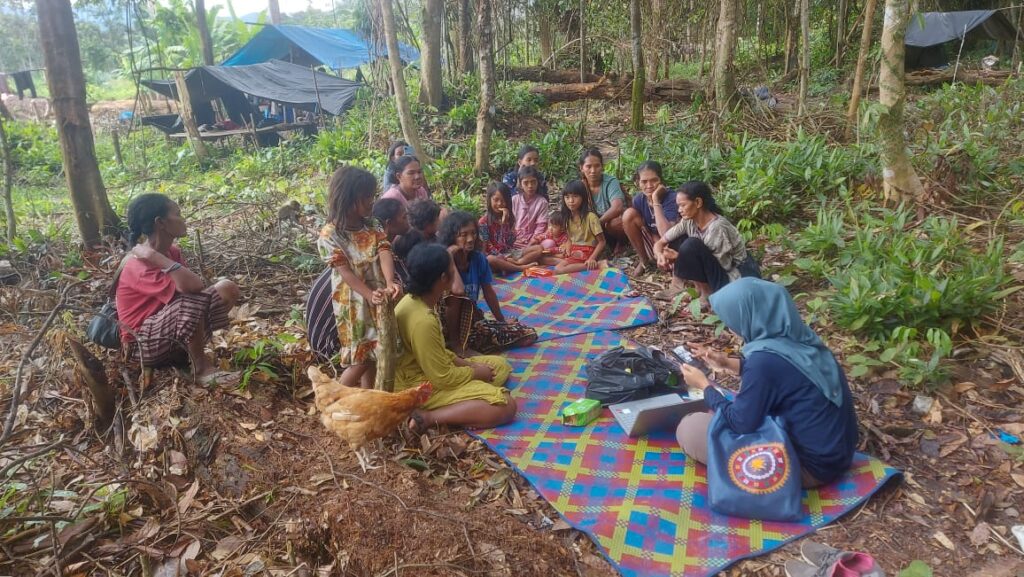Orang Rimba women in Semambu Village live in a forest area that intersects with the WCA area of PT. RLU where they still experience minimal access to services and participation in village development planning.
Traditionally, Orang Rimba women and children are protected by culture to remain in their environment, while adult men are allowed to travel in and out of the village. Therefore, after the forest is opened, men have more opportunities to gain access to public systems such as education, health services, population administration and access to information to the outside world.
Orang Rimba women in internal deliberations, such as customary meetings, are not always active in speaking. However, they basically listen carefully when customary deliberations are held. In principle, Orang Rimba women, although they do not speak, have a share in the opinions of their husbands when customary deliberations take place internally.
KKI Warsi held a series of critical discussion agendas for Orang Rimba women to raise awareness of basic service rights and social participation in the village and access to development carried out at the Orang Rimba location in the Hasan group (rombong) in the WCA PT.RLU area. In this discussion, a casual chat approach was used about the importance of basic services and their benefits, screening of documentary films about women's participation and roles in socio-political life for the struggle for women's rights, and a question and answer discussion.
During the discussion, some Rimba women were still shy, but after a film was shown as an introduction to the issue of women's roles and participation, they began to listen enthusiastically and began to respond to the discussion and questions and answers.
The enthusiasm of the Orang Rimba women began when they watched a film screening which perhaps made them amazed by the women in the video played on a laptop.
They started a discussion and Q&A led by Anggun, the discussion facilitator. They acknowledged that the role of women in the Orang Rimba is indeed more in domestic affairs as mentioned by Gejek, as the wife of Tumenggung, namely "Sajang saji masok matah, pelan pegawe tikor bantol gawe perempuan. Behuma betanom, lauk ikan, keranjang belanjo gawe jenton,jemput urang, memikul nan panjong, menghidup mati begawe bejenton" (those who cook and serve food, the work of making pillow mats is the work of women. Making fields, fishing, fulfilling life, carrying heavy work, turning on and off are the tasks of men).
In the context of development participation in Semambu Village, Orang Rimba women have never been directly involved in the development planning process, but after the film screening and discussions, they began to realize and be open to being involved in village deliberations or social activities with the villagers in general as mentioned by Nyunting Induk Nyulam.
"We have never attended a meeting in the village, because we have been invited. If we were invited, we could probably go with my husband," she said. (I have never attended a meeting in the village, because I was never invited, if I were invited, maybe I could go with my husband).
Nyunting's explanation implies that they are willing to participate in village decision-making discussions but still require the need to be with their husbands in participating in village meetings, the reason being that they are not yet accustomed to village meeting forums that are mixed between men and women. This is because the cultural values maintained by the Orang Rimba still protect Orang Rimba women.
In this discussion, women's aspirations also developed, especially related to health services, children's education and government support related to houses and road access to the Orang Rimba location. The access to education and health services requested by the Orang Rimba are services that are accessible to them. Education services are expected to have teachers who are willing to visit the Orang Rimba location because the existing elementary school is far from their location, and also the children of the Orang Rimba have not been able to adapt to the general public. They still feel ashamed and lack confidence to join the village community in general because of the negative stigma.
With this series of discussions, it is hoped that it can open the horizons of Orang Rimba women and increase awareness and self-confidence to be more open in accessing services and participating in decision-making in the village.


